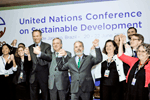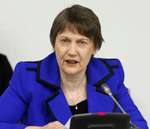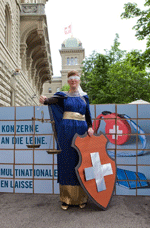Published on Thu, 2012-06-21 17:38
More than 100 heads of State and government prepare to approve on Friday in Rio de Janeiro, Brazil, the outcome document of the United Nations Conference on Sustainable Development (Rio2012). After intensive and protracted informal negotiations, representatives of 191 countries reached an agreement on Tuesday. |
Published on Thu, 2012-06-21 17:31
A high-level forum at the UN Conference on Sustainable Development (Rio2012) offered this week an opportunity to debate how to measure the social progress of the countries and the whole world without merely depending on economic indicators, and assessing at the same time the damage caused by human activities to the well-being of the future generations. |
Published on Thu, 2012-06-21 17:19
The "Corporate Justice" petition was signed by 135.285 people. This campaign urges the Federal Council of Switzerland and the Parliament to compel Swiss transnational corporations to respect human rights and the environment worldwide, reported Alliance Sud, focal point of Social Watch in the European country. According to the campaign, subsidiaries of Swiss transnational companies such as Xstrata, Glencore, Syngenta, Nestlé, Danzer, Triumph and Holcim violate human rights or pollute the environment abroad, while there is no way for the parent companies to be held accountable. |
Published on Wed, 2012-06-20 19:33
Five leading civil society international networks urged the European Union (EU) head of State and Government to “demonstrate a commitment” to ensure at Rio2012 “that policies and practices pursued” within and outside the bloc “are consistent with the principles of sustainable development”. |
Published on Mon, 2012-06-18 16:04
“The popular mobilization” in the Arab world “would not calm whatever the difficulties were until the achievement of the desired goals,” said Ziad Abdel Samad, Executive Director ofhe Arab NGO Network for Development (ANND), after its most recent General Assembly, held on 29-30 May in Beirut. |
SUSCRIBE TO OUR NEWSLETTER







